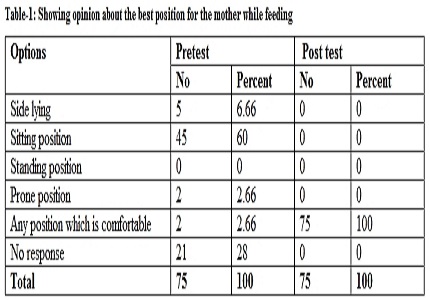Knowledge, attitude and practices of breast feeding in primigravida women in tertiary care hospital in central India
Abstract
Introduction: There are gaps between UNICEF and BFHI recommendations and actual implementations of breastfeeding practices due to inadequate counseling of primigravida on breastfeeding, reflected nationally as poor infant nutritional status.
Objectives: The study aims to assess the knowledge, attitude and practices of primigravida about breastfeeding, counsel the primigravida women on the prescribed scientific breastfeeding methods, to analyze the change in their perspective about breastfeeding after counseling and to suggest recommendations based on findings.
Methods: Questionnaire based descriptive cross sectional study conducted on selected 75 primigravida with gestational age of 36 weeks or more, attending ANC OPD or admitted to NKPSIMS during April and May 2014 after consent. A structured validated pre/posttest questionnaire was administered to assess the knowledge, attitude and practices of breastfeeding of participants. Demographic variables were recorded. Pretest was conducted, followed by counseling on the importance of breastfeeding, maternal nutrition, duration of exclusive breastfeeding, mother’s and baby’s position during breastfeeding using flashcards which was followed by posttest on the same questionnaire. The data was analyzed using SPSS software Open Epi Info version 2.3 year 2009. P values < 0.05 were considered as statistically significant.
Results: Comparison of pre/posttest results showed statistically significant change in importance of exclusive breast feeding, colostrum, early initiation, suitable position and duration of breastfeeding, perception of baby’s satisfaction and stool color, maternal nutrition and breast problems during lactation after counseling.
Conclusion: Antenatal breastfeeding counseling must be strengthened by a multi pronged individualized approach, reinforcement focusing on the recommended practices of breastfeeding to promote and sustain breastfeeding.
Downloads
References
National guidelines on infant and young child feeding. Ministry of Human Resource Development Department of Women and Child Development (Food and Nutrition board). Government of India 2004 http://wcd.nic.in/nationalguidelines.pdf
Carolina Global Breast feeding institute, Department of maternal and child health, Gillings school of global public health, University of north Carolina Global baby friendly hospital initiative monitoring data: update and discussion.
Kingston D, Heaman M, Fell D Chalmers B. Maternity Experiences Study group of Canadian Perinatal surveillance System, Public Health Agency of Canada. “Comparison of adolescent, young adult, and adult women's maternity experiences and practices”. Peadiatrics 2012 May;129(5).
Sanghvi T, Jimerson A, Hajeebhoy N, Zewale M, Nguyen GH. And young child feeding practices in different country settings. Food Nutr Bull. 2013 Sep;34(3 Suppl):S169-80.
Onayade AA, Abiona TC, Abayomi IO, Makanjuola RO. The first six month growth and illness of exclusively and non-exclusively breast-fed infants in Nigeria. East Afr Med J. 2004 Mar;81(3):146-53.
Shankar Narayan, Nisha Natarajan, Dr. KS Bawa. “Maternal and neonatal factors adversely affecting breastfeeding in the perinatal period”. Medical Journal Armed Forces India, 2005 Jul; 61(3): 216–219.
Losch M, Dungy CI, Russell D, Dusdieker LB. Impact of attitudes on maternal decisions regarding infant feeding. J Pediatr. 1995 Apr;126(4):507-14.
Chaturvedi P, Banait N. Knowledge and attitude regarding breast-feeding, in mothers attending antenatal clinics. Indian J Pediatr. 2000 Apr;67(4):259-62.
Su LL, Chong YS, Chan YH et al. “Antenatal education and postnatal support strategies for improvingrates of exclusive breast feeding: randomized controlled trial”. BMJ 2007; Sep 22;335(7620):596.
Dhandapany G, Bethou A, Arunagirinathan A, Ananthakrishnan S. Antenatal counseling on breastfeeding -- is it adequate? A descriptive study from Pondicherry, India. Int Breastfeed J. 2008 Mar 4;3:5. doi: https://doi.org/10.1186/1746-4358-3-5.
Rajesh K Chudasama, Panna C Patel,and Abhay B Kavishwar. “Determinants of Exclusive Breastfeeding in South Gujarat Region of India”. Journal of Clinical Medicine Research. 2009 Jun; 1(2): 102–108. doi: https://dx.doi.org/10.4021%2Fjocmr2009.06.1242.
Chidozie E Mbada, Adekemi E Olowookere, Joel O Faronbi, et al. “Knowledge, attitude and techniques of breastfeeding among Nigerian mothers from a semi-urban community”. BMC Research Notes. 2013, 6:552. DOI: https://doi.org/10.1186/1756-0500-6-552.



 OAI - Open Archives Initiative
OAI - Open Archives Initiative


